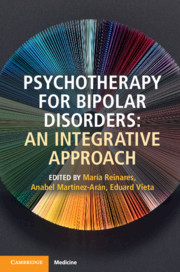Book contents
- Psychotherapy for Bipolar Disorders: An integrative approach
- Psychotherapy for Bipolar Disorders
- Copyright page
- Contents
- Collaborators
- Preface
- Part 1 An Introduction to Treatments
- Part 2 The Foundations of an Integrative Approach to Bipolar Disorders
- Part 3 An Integrative Approach to Bipolar Disorders
- Chapter 3.1 Introduction to the Integrative Approach
- Chapter 3.2 Contents of the Integrative Approach
- Book part
- Bibliography
- Index
Chapter 3.1 - Introduction to the Integrative Approach
from Part 3 - An Integrative Approach to Bipolar Disorders
Published online by Cambridge University Press: 18 October 2019
- Psychotherapy for Bipolar Disorders: An integrative approach
- Psychotherapy for Bipolar Disorders
- Copyright page
- Contents
- Collaborators
- Preface
- Part 1 An Introduction to Treatments
- Part 2 The Foundations of an Integrative Approach to Bipolar Disorders
- Part 3 An Integrative Approach to Bipolar Disorders
- Chapter 3.1 Introduction to the Integrative Approach
- Chapter 3.2 Contents of the Integrative Approach
- Book part
- Bibliography
- Index
Summary
As has been pointed out in the introduction, not only does bipolar disorder have a clinical impact but it can also affect other important areas in the lives of people who suffer from it, and their significant others. Therefore, the treatment of the disease should be comprehensive, taking into consideration different areas influenced by the illness. The sessions presented here, written in an informative way to be shared with those suffering from the illness, aim to cover clinical aspects and issues related to physical health, cognitive and psychosocial functioning, and the enhancement of well-being and quality of life. In order to address all these areas, the integrative approach was designed based on a combination of different psychological treatments previously described. Some contents of psychoeducation for patients have been combined with a session for family members, and complemented with aspects related to health promotion, mindfulness training and strategies for cognitive and functional enhancement, always adjunctive to pharmacological treatment. Therefore, the programmes represent the pillars on which the different modules of the integrative treatment were built.
- Type
- Chapter
- Information
- Psychotherapy for Bipolar DisordersAn Integrative Approach, pp. 61 - 63Publisher: Cambridge University PressPrint publication year: 2019
- 1
- Cited by



